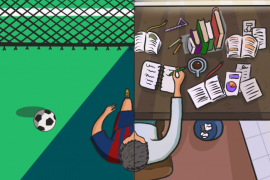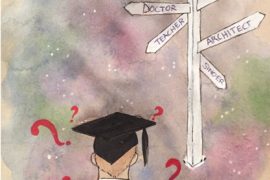Can you imagine how our schools will look like if more teachers started praising students for their effort in learning rather an A+?

I clearly remember my first A+. I was in first grade, after studying very hard for my English test through taking special tutoring classes during the summer vacation to aim for that A+. I got my results back, and the praise came along with it by my favorite teacher. My journey of striving for straight A’s started from that day onwards – that translates into memorizing, word-by-word, every sentence that I thought will be included in exams, keeping the holistic learning experience at the bottom of my priority list.
From a very young age, we are being told that our future is directly correlated to that A+. While grades are very crucial, this approach strips away any learning experience the child can attain from school – the main focus becomes grades. If you fail to get that A for some reason, you begin doubting your own competence and intellectual abilities instead of taking the chance to appreciate the learning experience – looking closely into what went wrong and learning from it. The issue is highlighted when the process is subordinate to the outcome, strategies of improving solely revolve around receiving that A rather than acquiring the right skills.
We might think that the grade-system stops at college when our intellectual skills are no longer being substantially tested in exams. However, what we fail to realize is that the seeds that have been planted at such an early age will always flourish throughout adulthood. After graduating from college and getting into the real world with its not-so straightforward challenges, we are still searching for the reassuring A+ that bolsters our competency. Did we pass or fail this relationship? Am I liked by my peers or not? Did I ace that task at work or was it an average B-?
Unfortunately, what we fail to realize is that, unlike school, life cannot be measured by a direct yes-or-no answer. If we continue to embed this grading system into our children, we will have fewer people who are genuinely interested in growing and learning from their setbacks, and more people who tie their self-worth to grades, people’s approvals, and the number of likes on their social media outlets.
As ironic as it might sound, taking your eye off that A+ and into the learning process might improve your grades. They can come as a byproduct of optimizing the learning process. Through our openness to failure, learning from constructive criticism, and creating connections between your existing knowledge and newly encountered challenges.



